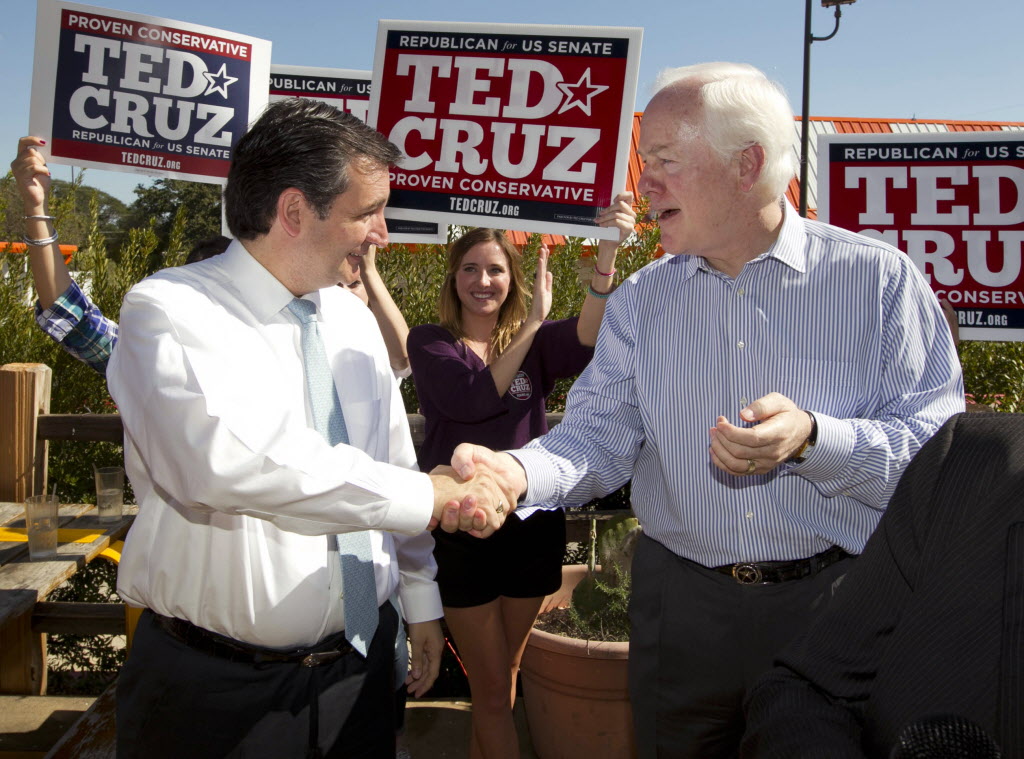
In this June 6, 2012, House Speaker John Boehner of Ohio, accompanied by Sen. Mitch McConnell of Ky., right, gestures during a news conference on Capitol Hill in Washington. The GOP's election victory Tuesday places them in an undisputed leadership position, which means that they can no longer simply blame the Democrats for the nation's problems. They have to come up with solutions, especially regarding immigration. (AP Photo/J. Scott Applewhite, File)
After six years of GOP politicians hammering President Barack Obama on immigration, there’s no longer any argument about whose job it is to solve the problem. GOP politicians from Texas to Washington have insisted for years that they cannot address other aspects of immigration reform until the border is secure.
Texas Sen. Ted Cruz has led the charge on this front. Texas state Sen. Dan Patrick, the lieutenant governor-elect, suggested in campaign ads that his opponent in Tuesday’s election was somehow comfortable letting thousands of illegal immigrants and ISIS — yes ISIS — into our country because of what he claimed were her lax measures on border security. The GOP has done nothing but blame the Democrats for the state of our border. And they successfully portrayed this as one of the top, if not the top, national security issues.
If that’s the case, then certainly it’s a top agenda item for the Republican leadership to tackle when they take control in January. So let’s turn to the immigration solutions offered in the agenda outlined in today’s Wall Street Journal by Sen. Mitch McConnell, the likely Senate majority leader, and House Speaker John Boehner. Hmm, the list their top priorities as: repeal Obamacare, authorize construction of the Keystone XL pipeline, push the Hire More Heroes veterans-employment act, promote innovative charter schools. As they write in the Journal, they also plan to address:
• The insanely complex tax code that is driving American jobs overseas;
• Health costs that continue to rise under a hopelessly flawed law that Americans have never supported;
• A savage global terrorist threat that seeks to wage war on every American;
• An education system that denies choice to parents and denies a good education to too many children;
• Excessive regulations and frivolous lawsuits that are driving up costs for families and preventing the economy from growing;
• An antiquated government bureaucracy ill-equipped to serve a citizenry facing 21st-century challenges, from disease control to caring for veterans;
• A national debt that has Americans stealing from their children and grandchildren, robbing them of benefits that they will never see and leaving them with burdens that will be nearly impossible to repay.
Sounds ambitious. But, amazingly, they seem to have overlooked immigration and border security. This enormously huge crisis affecting our southern border — the one that Democrats were so lax in dealing with and that only Republicans were capable of addressing head on because of Ebola and ISIS and the implications for the survival of our nation — is nowhere to be found in the McConnell-Boehner agenda.
Sorry guys, you don’t get off that easily. You are required to come up with a border security plan. Your legislation also must address: increased funding for border security, increased hiring of thousands of border patrol officers, increased funding for detention facilities, increased funding for immigration courts to reduce the current backlog of tens of thousands of cases. And you must do this now because this is one of the top scare-tactic issues that GOP candidates used to win this election.
Okay, you won. Now, let’s hear your solutions.


















